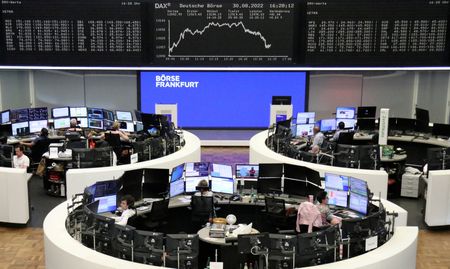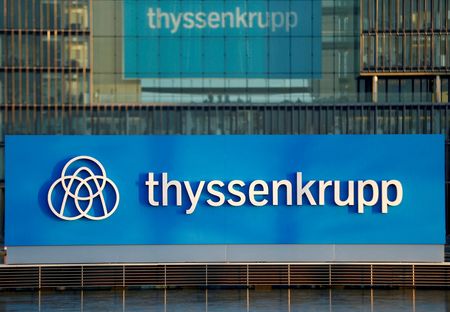By Christoph Steitz and Ludwig Burger
FRANKFURT (Reuters) – Activist investors are renewing their years-long efforts to break up some of Germany’s most venerable companies, seeing streamlining as a promising route to reviving share prices as Europe’s top economy emerges from the energy crisis.
This week Brenntag, founded in 1874 as an egg trader in Berlin, became the latest target of investors, who called for the chemicals distributor to spin off its specialties unit. Bayer, Fresenius and Thyssenkrupp have seen similar demands to release value.
That signals a rebound in shareholder activism that may force companies to consider major overhauls and spin-offs, executives and investors say, after a lull last year that investment bank Lazard attributed to the energy crisis triggered by the war in Ukraine.
Lawrence Elbaum, co-head of law firm Vinson & Elkins’ shareholder activism practice, said investors were looking for value-boosting strategies that do not require much funding in a difficult market.
Deka Investment, which has around 367 billion euros ($392 billion) in assets under management and holds stakes in most major German corporations, has repeatedly called out German companies for structural weaknesses.
Its head of sustainability and corporate governance Ingo Speich said he expects activism to pick up in 2023, supported by “the low valuation of German corporations compared to the U.S., and an activism landscape that’s not particularly big”.
Germany’s blue-chip DAX 30 index put in the worst performance of any major European stock market in the past year, rising just 2%. A price-to-earnings (PE) ratio of 14.6 for the German benchmark DAX index falls well short of the 20.9 PE ratio for the U.S. S&P 500.
With their long history – several were founded in the 19th century – many of Germany’s biggest corporations have accumulated businesses that no longer make sense to be combined under one roof, said Speich.
“We are no pure-play fanatics and neither are we fans of conglomerates. But when a company is undervalued, then there’s a reason for that,” he said.
‘LEANER SET-UP’
The United States has a much richer history of corporate break-ups, exemplified by plans unveiled in October by medical device maker Medtronic, which is creating a new company out of its patient monitoring and ventilators businesses.
Other U.S. examples over the last two years include Johnson & Johnson, General Electric and 3M.
Joe Kaeser, supervisory board chairman of Siemens Energy, said the United States was much more advanced, and also more successful, in the field of shareholder activism.
“A leaner set-up can take advantage of untapped energy and crystallise hidden value, especially in a complex environment with difficult market conditions,” he told Reuters.
As CEO of conglomerate Siemens AG from 2013 until 2021, he engineered one of Germany’s most successful corporate break-ups, separately listing Siemens Energy and Siemens Healthineers and merging Siemens’s wind unit with Spain’s Gamesa.
Management and governance problems are still rife in Germany, creating activist opportunities, said Kaeser. He said a certain “friends and family” attitude in German board rooms meant there was less awareness that companies belong to their shareholders than elsewhere.
For Siemens shareholders, the slimming-down paid off. German wealth manager Flossbach von Storch said last month Siemens had created around 126 billion euros in value – defined by dividends, share buybacks and stock price development – since 2003, the most among all German listed companies.
But another leaner machine serves as a reminder that there’s no guarantee shrinking will unlock value – conglomerate Thyssenkrupp, which has been shedding assets for years, is among the biggest value destroyers, the study found.
($1 = 0.9366 euros)
(Reporting by Christoph Steitz and Ludwig Burger; Additional reporting by Svea Herbst, David Carnevali and Emma-Victoria Farr; Editing by Josephine Mason and Jan Harvey)




